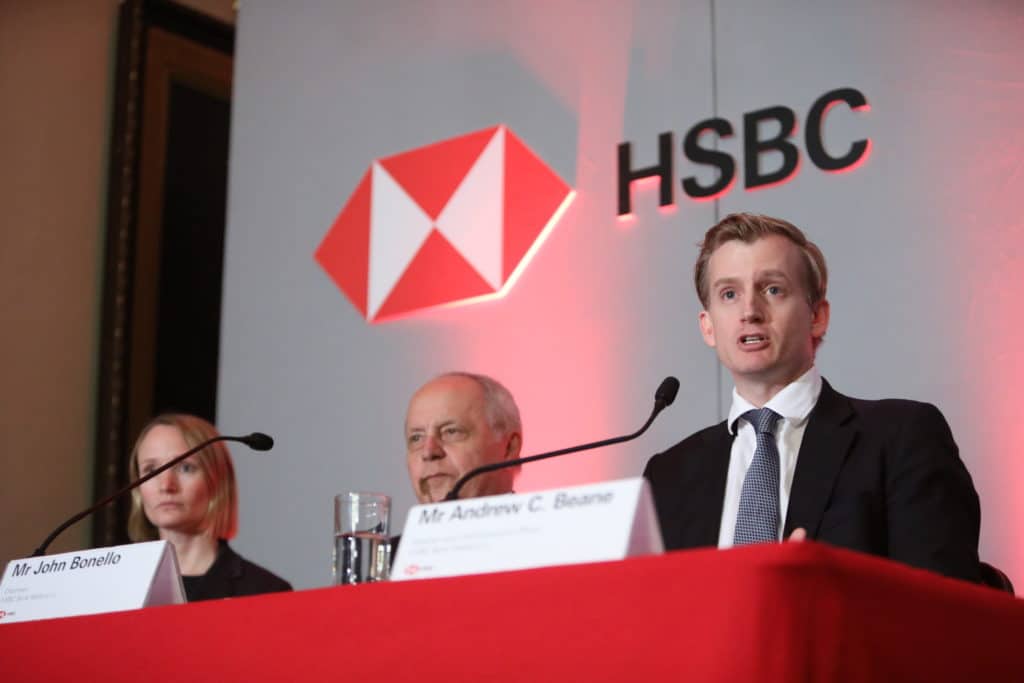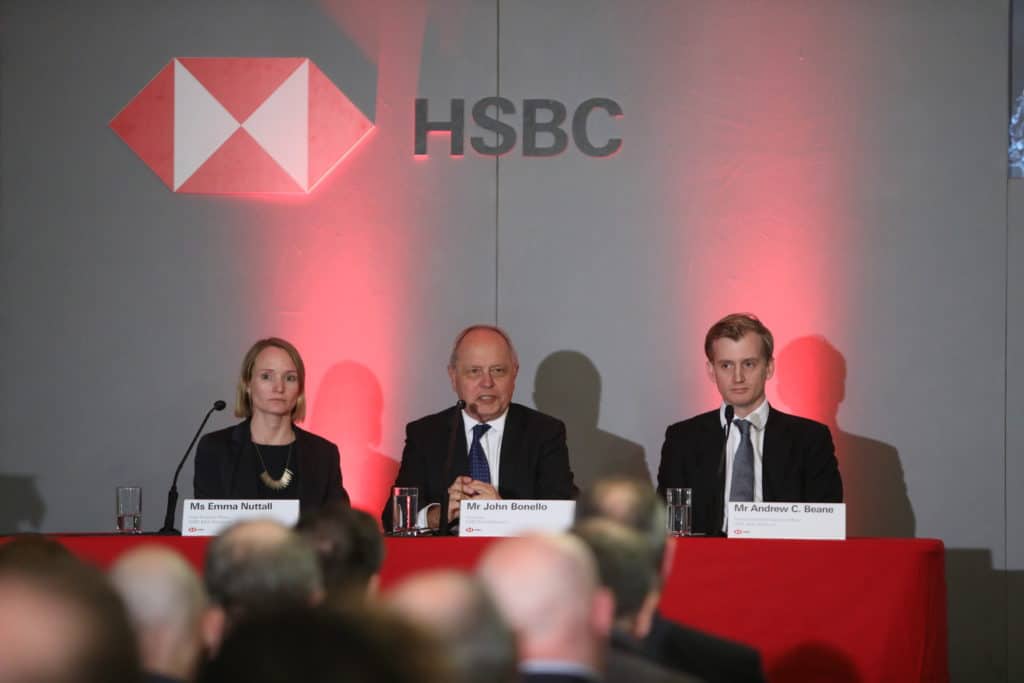
HSBC reports strong financial performance
Strategy Execution
- Higher adjusted profit in 2019 ahead of management expectations driven by continued focus on cost reduction and credit quality.
- Higher profitability supported by revenue growth in retail banking and balance sheet management.
- Lending growth in commercial banking as momentum increased in the fourth quarter of the year.
- Positive Jaws (revenues growing faster than costs) of 4.8% delivered, driven by cost reduction initiatives.
- Reported profit and return on equity are lower due to a one-off restructuring provision that will deliver cost savings going forward.
- Material achievements in delivery of HSBC’s strategic plan; new digital solutions launched and traditional channels re-modelled. Digital usage within retail banking increased by over 90% and new retail customer acquisition increased over 60%.
- Strong dividend generation enabled by HSBC’s signature risk standards, payout ratio of 30% sustained on an adjusted basis which represents a full year payout ratio of 44% for 2019, on a reported basis.

Financial Performance
- Adjusted profit before tax for the year ended 31 December 2019, which excludes the impact of notable items, of €45.3m, which represents an increase of €8.8m, or 24% compared with prior year.
- Reported profit before tax which includes the impact of a one-off restructuring provision of €30.7m, a decrease of €7.8m or 20%. The investment in restructuring will deliver sustainable cost savings going forward.
- Recommended gross final dividend of 2.1 cents per share (1.4 cents per share net of tax).
- Adjusted cost efficiency ratio of 70% compared with 73% for 2018.
- Reported profit attributable to shareholders of €20.2m for the year ended 31 December 2019 resulting in earnings per share of 5.6 cents compared with 8.0 cents in the same period in 2018.
- Strong capital base with a common equity tier 1 ratio of 16.4% up from 14.6% at the end of 2018. Total capital ratio was 19.0% compared to 17.0% at 31 December 2018.
- Return on equity of 4.3% for the twelve months ended 31 December 2019 reflecting the investment in restructuring compared with 6.1% for the same period in 2018. Excluding notable items return on equity is 6.4%.
- Net loans and advances to customers were €3,257m, up €147m or 5% compared with 31 December 2018.
- Customer deposits increased by 2% to €4,977m at 31 December 2019.
- Strong Liquidity Position with advances to deposits ratio marginally higher at 65%.

Financial Performance Commentary
The adjusted profit before tax for the year ended 31 December 2019 was €45.3m. This represents an increase of €8.8m or 24% compared to prior year. The adjusted results exclude the impact of the following notable items:
- a restructuring provision of €16.0m in 2019; and
- a provision release relating to the brokerage remediation of €1.4m in 2019 versus €2.0m release in 2018
Reported profit before tax which includes the above items, was €30.7m, a reduction of €7.8m or 20% versus same period last year.
Reported profit attributable to shareholders was €20.2m resulting in earnings per share of 5.6 cents compared with 8.0 cents in the same period in 2018.
Net interest income (NII) of the bank increased by 1% to €110.1m compared with 2018. Strong growth in mortgage NII offset the reduction in commercial banking NII as a result of lower average commercial loan balances versus 2018. Despite the European Central Bank deposit rate declining further, the bank increased the revenues on excess liquidity due to proactive management within the same conservative risk appetite.
Net non-interest income marginally decreased with strong fee performance within commercial banking as a result of the new fees offset by a reduction in fee income within Insurance due to the disposal of a specific insurance portfolio in December 2018.
Net trading income increased by €1.8m due to a fair value gain on VISA shares.
Reported operating costs were €120.7m which includes the restructuring provision of €16.0m which will deliver sustainable savings from 2020 onwards with full annualised saving delivered in 2021. Excluding the restructuring provision, adjusted operating expenses were €104.7m, an improvement of €3.7m or 3% driven by a number of cost initiatives which more than offset the inflationary costs, new pension expenses and continued investments in digital.
Expected credit loss (ECL) for the year ended 31 December 2019 was €0.4m, an improvement of €3.1m versus 2018. The low charge in 2019 was driven by a number of recoveries and repayments across both retail and commercial.
There was a €1.4m positive movement in the provision for brokerage remediation costs in 2019. In 2016, the bank raised a provision totalling €8m in relation to a remediation of the legacy operational failure in the bank’s brokerage business. During 2017, the remediation programme was largely completed and it was assessed that a partial reversal of the conservatively estimated provision was warranted. In this regard, a reversal of €1.8m was effected in 2017. In 2018, an additional reversal of €2m was effected and the final provision of €1.4m was released in 2019 as the programme is now deemed closed.
The effective tax rate was 34%. This translated into a tax expense of €10.5m, €0.7m higher than the €9.9m expense for 2018. During 2018, the bank benefited from a different tax treatment applied on a specific transaction.
HSBC Life Assurance (Malta) Limited reported a profit before tax of €3.1m, €0.6m lower than prior year. The insurance company was adversely impacted by negative market movements in 2019.
Financial Position & Capital
Net loans and advances to customers increased by 5% to €3,257m with retail balances up 6% and commercial balances 2% higher than December 2018. The bank continued to improve the asset quality by reducing non-performing exposures by 13% versus prior year.
Customer deposits grew by 2% to €4,977m with a 4% increase in retail deposits more than offsetting the 6% reduction in commercial. The bank maintained a healthy advances to deposits ratio of 65% and its liquidity ratios were well in excess of regulatory requirements.
The financial investments portfolio increased by 4% to €944m. The risk appetite for investment quality remained unchanged. The portfolio is managed as a high-quality liquidity buffer consisting of securities of sovereign and supranational issuers rated A- (S&P) or better.
The bank’s capital ratios continued to improve with CET1 increasing from 14.6% to 16.4% and the total capital ratio improving from 17.0% to 19.0%. The bank continued to have a strong capital base and is fully compliant with the regulatory capital requirements. The bank managed down RWAs across 2019 driven by placements of excess liquidity and improved collateral recognition. A €13m net dividend was paid from the Insurance subsidiary which also drove the increase in CET1.
While the bank continues to build up capital reserves for the new non-performing loan (NPL) requirements, the proactive capital actions across 2019 enable the bank to declare a 30% dividend on full year adjusted profits recognising the importance of the dividends to our shareholders. This will bring the full year 2019 dividend payout ratio to 44% on a reported basis. The final gross dividend will be 2.1 cents per share (1.4 cents per share net of tax) which, together with the gross interim dividend of 1.7 cents per share (1.1 cents per share net of tax) paid in September 2019, brings the total dividend for 2019 to 3.8 cents (2.5 cents net of tax).
The final dividend will be paid on 15 April 2020 to shareholders who are on the bank’s register of shareholders at 9 March 2020.
Andrew Beane, Chief Executive Officer at HSBC Bank Malta p.l.c., said:
“HSBC’s financial performance in 2019 exceeded expectations driven by revenue growth in retail banking, excellent progress on cost management, and a low level of expected credit losses. Performance in our commercial and insurance divisions was less strong and we have taken a number of actions to address this with both businesses demonstrating progress in the final quarter of the year. HSBC’s signature risk management standards and the positive trading performance have again enabled us to generate a dividend for shareholders.
“Looking to the future, it is clear that the ways customers are using banks is profoundly changing with the rapidly growing adoption of digital services, notably on mobile devices. At the same time, the interest rate outlook has deteriorated which is creating pressure on the profitability of banking across the Eurozone. The Board considered these factors carefully in 2019 and concluded that to succeed over the longer term it was necessary to change elements of our business model in order to both meet these changing customer expectations, and to enable a transition to a more sustainable cost platform which can accommodate the interest rate outlook. The restructuring actions we announced in October position HSBC well for the future and provide clarity to our customers and employees. The associated one-off costs are reflected in our reported numbers but they have not impacted our dividend which has been sustained at the same payout ratio on an adjusted basis.
“In 2020 we will see the full year benefit of the investments we made in digital last year while making new investments to upgrade our self-service channel and in our re-modelled branch network. I am particularly looking forward to the opening of our national flagship branch in Qormi later this year which will be our largest branch in the country. In our commercial division we remain Malta’s leading international bank, uniquely able to connect Maltese companies into the global economy and high quality inbound investors to Malta.
“Turning to the operating environment it is clear that developments in the local market have regrettably caused further damage to Malta’s reputation as a financial services centre. Sustainable economic growth requires full compliance with the rules of the international financial system and the reviews of objective international bodies, such as Moneyval, have set out clearly that significant improvements are required. While we welcome the action plans that have been announced, 2020 will represent an essential test of the capacity of Malta’s institutions to demonstrate significant progress.
“At HSBC we are proud of our values and the standards we uphold. Our commitment to invest and remodel our business to further embed these standards in recent years has necessarily resulted in a business which is smaller but stronger. However, this phase of our strategy is complete and, as we evidenced in 2019, the future focused HSBC model is strongly profitable, is producing dividends for shareholders and is protecting our stakeholders from the range of risks we face. It is for these reasons that The Banker Magazine, part of the Financial Times Group, has awarded HSBC the title of Malta’s best bank for the fourth consecutive year. I would like to thank my colleagues for their dedication and hard work in 2019, and our customers and shareholders for their trust.”
- February 18, 2020 No comments Posted in: Business Tags: HSBC Malta, profits





